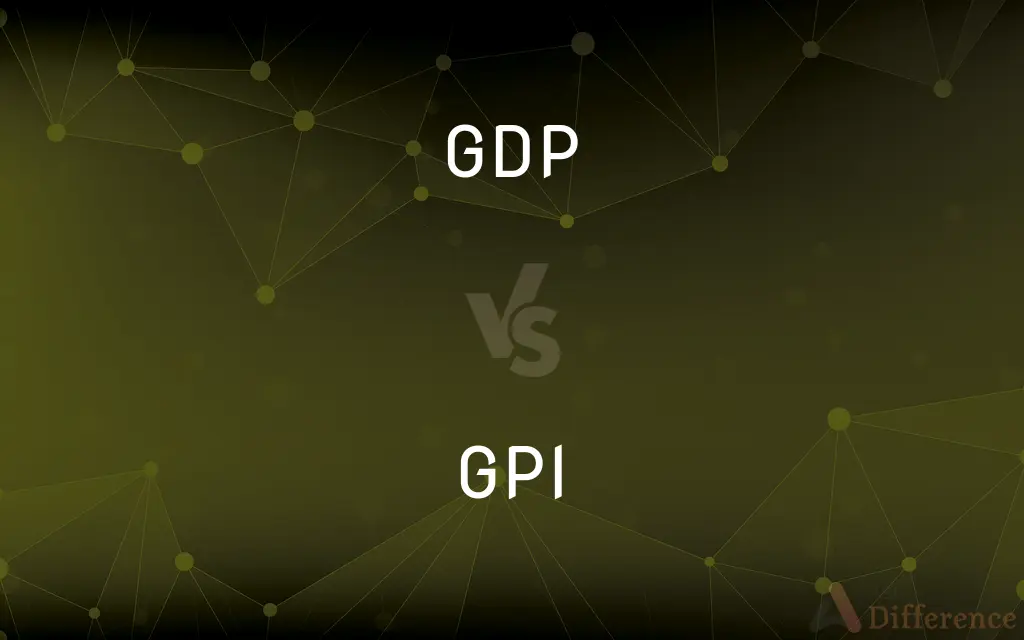GDP vs. GPI — What's the Difference?
By Tayyaba Rehman — Published on October 25, 2023
GDP measures a country's economic output, while GPI accounts for economic, environmental, and social factors in measuring well-being.

Difference Between GDP and GPI
Table of Contents
ADVERTISEMENT
Key Differences
GDP, or Gross Domestic Product, is a widely recognized metric that gauges the total monetary value of all goods and services produced within a country's borders in a specific time frame. It is a powerful tool to assess the economic health and growth of a nation.
In contrast, the GPI, or Genuine Progress Indicator, goes beyond just economic output. Instead, it attempts to provide a more comprehensive view by considering the economic, environmental, and social well-being of a nation. It factors in elements such as income distribution, environmental degradation, and the value of leisure time.
The significance of GDP in the global economy cannot be understated. It's used by governments, policymakers, and economists to formulate policies, assess economic performance, and compare the economic power of different countries.
However, GPI emerges as a more holistic metric. While GDP might increase with the production of goods, GPI might decrease if the production harms the environment or increases inequality. GPI provides an insight into whether growth is sustainable and beneficial for all citizens.
Ultimately, while GDP offers a snapshot of economic prowess, GPI presents a more nuanced view, weighing both the positive and negative aspects of growth.
ADVERTISEMENT
Comparison Chart
Definition
Monetary value of all goods and services produced.
Comprehensive metric considering economic, environmental, and social well-being.
Factors Considered
Economic output.
Economic output, environmental costs, social factors.
Use
Economic health and policy formulation.
Assessing true progress and well-being.
Limitation
Only considers economic activity.
More complex to calculate.
Typical Increase Causes
More production and sales.
Sustainable practices, equitable growth, environmental conservation.
Compare with Definitions
GDP
An indicator of a country's economic health.
A growing GDP often signifies a thriving economy.
GPI
An assessment of genuine progress and sustainable growth.
Governments looking for holistic growth are starting to consider GPI alongside GDP.
GDP
A tool to compare the economic power of different countries.
Based on GDP, China and the USA are among the world's largest economies.
GPI
An indicator to ensure growth benefits all citizens.
For a more equitable society, leaders are turning their focus from just GDP to GPI.
GDP
The total monetary value of goods and services produced in a country.
The GDP of the USA reflects its economic power globally.
GPI
An alternative to GDP that measures well-being more comprehensively.
Some experts believe GPI provides a clearer picture of a country's progress.
GDP
A measure of a nation's economic performance.
Economists were concerned when the country's GDP contracted for two consecutive quarters.
GPI
A measure considering both positive and negative aspects of growth.
The GPI dropped this year due to increased inequality and pollution.
GDP
A yardstick for economic growth over time.
The country's GDP has doubled over the past decade.
GPI
A metric that factors in economic, environmental, and social indicators.
While the country's GDP increased, its GPI showed a decline due to environmental degradation.
GDP
Measure of the United States economy adopted in 1991; the total market values of goods and services by produced by workers and capital within the United States borders during a given period (usually 1 year)
Common Curiosities
What does GDP stand for?
GDP stands for Gross Domestic Product.
Why is GDP so commonly referenced?
GDP is a straightforward measure of economic health and power, widely used in policy and economic analysis.
Is GDP a good measure of citizens' well-being?
Not entirely. GDP indicates economic activity, but doesn't account for distribution or environmental costs.
Can a country have high GDP but low GPI?
Yes, if economic growth is accompanied by environmental harm or increased inequality, GPI may be lower.
How is GPI different from GDP?
While GDP measures economic output, GPI factors in economic, environmental, and social well-being.
Is GDP only about production?
GDP measures both production and consumption within a country.
Why was GPI introduced?
GPI was developed to provide a more comprehensive measure of progress and well-being than GDP alone.
Is a higher GDP always desirable?
Not always. Growth without considering sustainability or equity might lead to long-term issues.
How is GPI calculated?
GPI considers the benefits of economic activity but deducts negative effects like environmental harm.
Can GDP and GPI both increase simultaneously?
Yes, if growth is both economically beneficial and sustainable.
Which is a better metric, GDP or GPI?
It depends on the goal: GDP for pure economic output, GPI for a broader sense of well-being.
Does GPI consider environmental factors?
Yes, GPI deducts costs like pollution and resource depletion.
Do all countries use GPI?
No, it's less common than GDP but is gaining recognition.
What might cause a drop in GPI?
Factors like increased inequality, environmental damage, or loss of leisure time can decrease GPI.
Why doesn't every nation adopt GPI?
GPI is more complex and requires a broader set of data than GDP.
Share Your Discovery

Previous Comparison
Project Management vs. General Management
Next Comparison
Tandoor vs. OvenAuthor Spotlight
Written by
Tayyaba RehmanTayyaba Rehman is a distinguished writer, currently serving as a primary contributor to askdifference.com. As a researcher in semantics and etymology, Tayyaba's passion for the complexity of languages and their distinctions has found a perfect home on the platform. Tayyaba delves into the intricacies of language, distinguishing between commonly confused words and phrases, thereby providing clarity for readers worldwide.














































